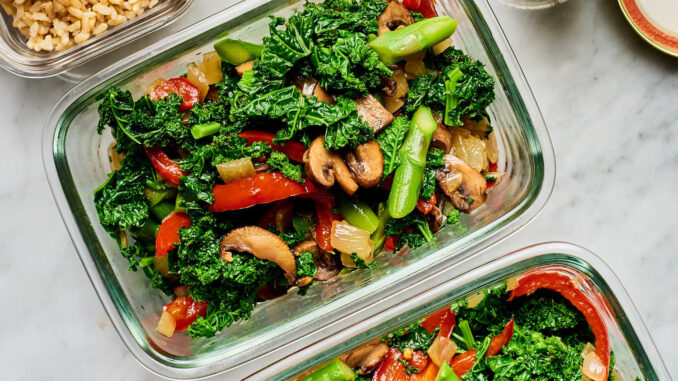
Introduction:
Meal prepping has become a popular practice for individuals looking to save time, money, and stress while maintaining a healthy and balanced diet. By preparing meals in advance, you can streamline your cooking process, reduce food waste, and ensure that you have nutritious options readily available throughout the week. In this extensive guide, we will explore the benefits of meal prepping, discuss essential tips and techniques, and provide practical advice for planning and executing your weekly meal prep routine.
Benefits of Meal Prepping:
Before diving into the specifics of meal prepping, it’s essential to understand the numerous benefits it offers:
- Time-Saving: By dedicating a few hours to meal prep each week, you can save valuable time during busy weekdays when cooking from scratch may not be feasible.
- Budget-Friendly: Meal prepping allows you to buy ingredients in bulk, take advantage of sales, and minimize impulse purchases, ultimately saving you money on your grocery bill.
- Healthier Choices: By preparing your meals in advance, you have greater control over portion sizes and ingredients, making it easier to stick to your dietary goals and avoid unhealthy fast food options.
- Reduced Stress: Knowing that your meals are planned and prepared in advance can alleviate the stress of last-minute cooking decisions and ensure that you always have something nutritious to eat.
Essential Tips for Meal Prepping:
- Plan Your Menu: Start by creating a weekly meal plan that includes breakfast, lunch, dinner, and snacks. Consider your dietary preferences, nutritional needs, and any special occasions or events that may influence your menu choices.
- Choose Recipes Wisely: Opt for recipes that are simple, versatile, and can be easily scaled up or down to accommodate your meal prep needs. Look for dishes that can be prepared in large batches and reheated without sacrificing taste or quality.
- Invest in Quality Containers: Invest in a set of high-quality, airtight containers in various sizes to store your prepped meals. Glass containers are ideal for reheating food in the microwave or oven and are more durable than plastic alternatives.
- Prep Ingredients in Bulk: Save time by prepping ingredients in bulk, such as chopping vegetables, marinating proteins, and cooking grains or legumes. Store prepped ingredients separately to maintain freshness and prevent them from becoming soggy.
- Use Proper Storage Techniques: Properly store prepped meals in the refrigerator or freezer to ensure they remain safe to eat throughout the week. Label containers with the date and contents to keep track of expiration dates and prevent food waste.
- Rotate Your Meals: To avoid meal fatigue, rotate your meals throughout the week and incorporate a variety of flavors, textures, and cuisines into your menu. Get creative with your ingredients and experiment with new recipes to keep things exciting.
- Schedule Your Prep Time: Set aside dedicated time each week for meal prep, whether it’s on a Sunday afternoon or a weeknight after work. Treat it like an appointment and prioritize it as part of your weekly routine.
Practical Meal Prep Ideas:
- Overnight Oats: Prepare individual servings of overnight oats by combining rolled oats, milk or yogurt, and your favorite toppings in mason jars. Store them in the refrigerator overnight for a quick and easy breakfast option.
- Mason Jar Salads: Layer mason jars with salad greens, vegetables, protein, and dressing for a convenient grab-and-go lunch option. Keep the dressing separate until you’re ready to eat to prevent the salad from becoming soggy.
- Sheet Pan Dinners: Prepare sheet pan dinners by roasting a variety of vegetables and proteins on a single sheet pan for easy cleanup. Season them with your favorite herbs and spices for added flavor.
- Freezer-Friendly Meals: Cook large batches of soups, stews, casseroles, and stir-fries that can be portioned out and stored in the freezer for future meals. Reheat them as needed for a quick and satisfying dinner option.
- Snack Packs: Create individual snack packs with nuts, seeds, dried fruit, cheese, crackers, or sliced vegetables for healthy snacking throughout the week. Portion them out in advance to avoid mindless munching.
Conclusion:
Meal prepping is a valuable tool for busy individuals looking to simplify their lives, save time and money, and maintain a healthy and balanced diet. By following the tips and techniques outlined in this guide, you can master the art of meal prepping and enjoy the benefits of delicious, nutritious meals all week long. Whether you’re a seasoned meal prep pro or just starting out, with a little planning and preparation, you can transform your cooking routine and set yourself up for success in the kitchen.